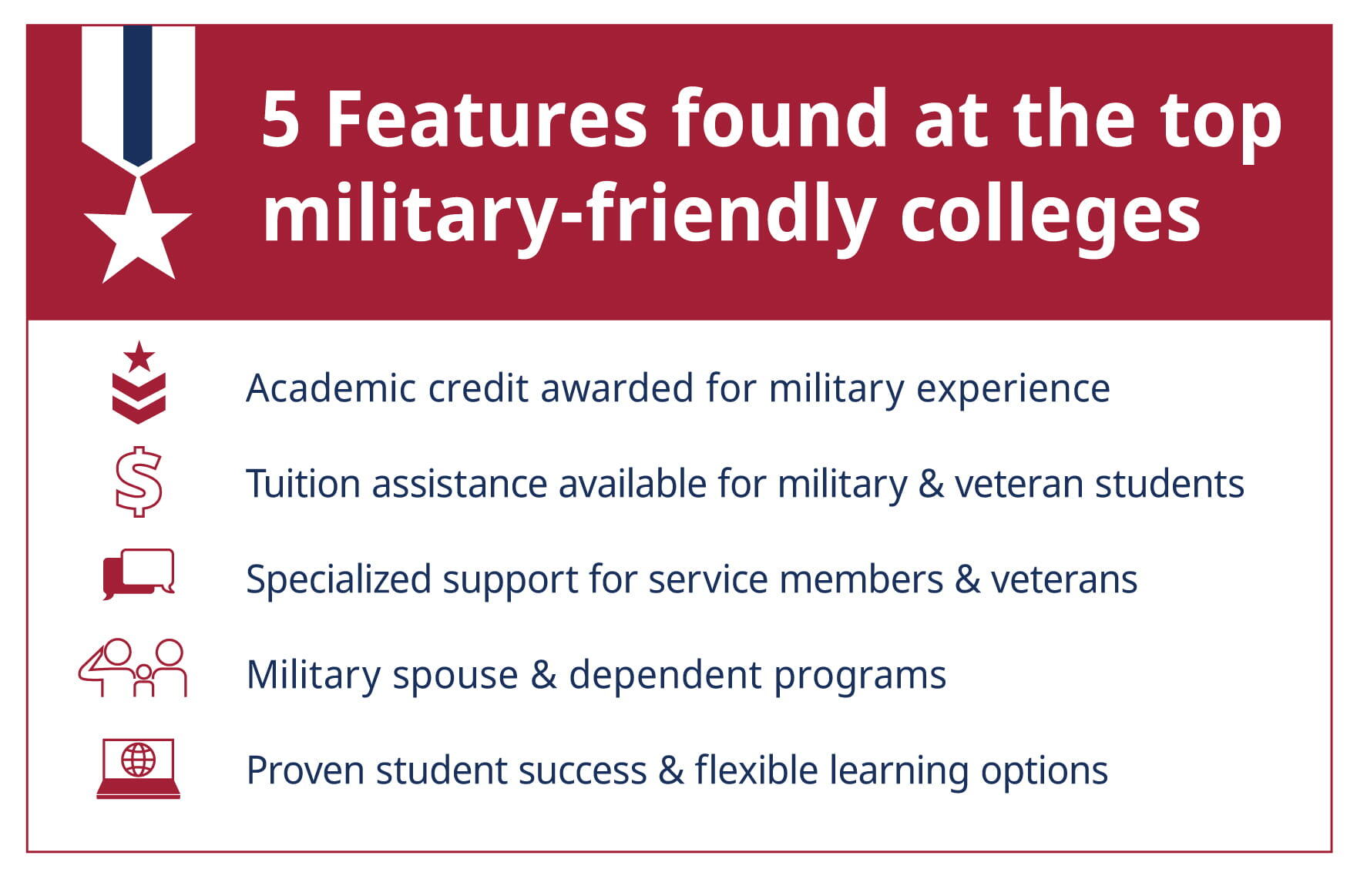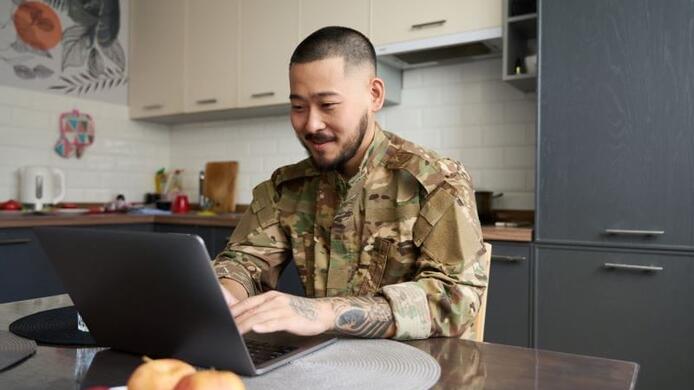UMass Global offers a wide variety of degree programs for active military and veterans. Explore your options and find a degree that fits you.

Every college student hopeful has a list of criteria they’re looking for to determine whether a particular school is the right fit. Most students want institutions that are affordable, have the academic programs they’re interested in, and meet their lifestyle needs. Military and veteran families have even more factors to keep in mind.
Consider that while the Post-9/11 GI Bill® enables most service members and veterans to receive up to 36 months of education benefits at participating colleges and universities, not all GI Bill®-approved schools offer the same opportunities. It's important to spend time researching which schools are truly military-friendly, making sure they match your needs.
To help you weigh your options, we’ve compiled a list of the five most prominent features that every student who’s served in the armed forces should look for in a college.
Why Choose a Military-Friendly School?
As a veteran, you may be wondering why you should worry about attending a military-friendly school. After all, you're transitioning back to civilian life, so why is this designation so important? As long as you can use your GI benefits, does the designation impact your education? The answer is yes. There are several reasons why it makes sense to look for colleges that cater to and appreciate their students with military backgrounds.
First, military-friendly colleges have proven that they understand the complex needs of veterans. From the emotional concerns of returning to civilian life to other unique attributes that come from a military career, these schools have the support services you need for your transition.
Second, both military-friendly online and brick-and-mortar colleges work to make the most out of your past experience. You may be able to receive credit for your military training and experience, enabling you to earn a degree or certificate that much faster.
Finally, military-friendly colleges often have a strong sense of community among their veteran students. This can make it easier to connect with others who share your life experiences.
The bottom line is this: military-friendly schools are investing in veterans and their education. By choosing a school that appreciates its military students, you'll get the most out of your GI Bill benefits and your overall college experience.
Finding a Military-Friendly College
As you search for a military-friendly college, you will notice that many schools have graphics or claims that they are great for veterans, and they may even have a logo or tagline to prove it. However, these logos sometimes do not come with any official certification or program. Anyone can claim to be military-friendly. You need to dig a little deeper to ensure the school you’re considering really is going to have your best interests in mind.
Official “Military Friendly” designation is different. This status, officially offered by the veteran organization VIQTORY, means the school has completed a survey showing that their institution is in good standing with the federal government and is doing what it can to support veterans. An official “Military Friendly” school must meet three out of six benchmarks set forth by the VIQTORY organization. These benchmarks include:
- Retention Rate Year 1: Either all students have a retention rate of 50% or the veteran retention rate is higher than the percent of all students.
- Retention Rate Year 2: The same regulations as Year 1 Retention Rate.
- Graduation Rate: An all-student graduation rate of 50%, or a higher graduation rate for veteran students than all students.
- Job Placement Rate: A job placement rate of 50% for all students, or the veteran job placement rate is higher than all students.
- Loan Repayment Rate: A loan repayment rate of 50% for all students, or the veteran student rate is a higher percentage.
- Loan Default Rate: Less than 20% of students default on their college loans.
UMass Global is pleased to be a ”Gold Standard Military Friendly” school. This means we’ve met or exceeded these benchmarks as well as the social and cultural support VIQTORY looks for when choosing a military-friendly school. In addition, we’ve ranked 14th in the nation for online colleges that are military-friendly, according to Military Times.
5 Things the Best Military-Friendly Colleges Have in Common
Meeting the above benchmarks is important, but there are other factors that show a school is truly military-friendly. When it comes to supporting military families’ unique needs, not all colleges measure up. Look into these five features while you search for an institution that can prepare you for a thriving career in the civilian workforce.
1. Academic Credit for Military Experience
Experience in the armed forces doesn’t just equip service members for success in their particular branch of the military. There are a number of transferable skills you acquire during your service. While it makes sense that the work you’ve already done would be applied toward earning a degree, not all schools see it that way.
As you search for the right military-friendly college, look into whether the institutions you’re considering accept military training for academic credits. Attending one that does could significantly cut down the time it takes to earn your degree and move into the next phase of your career.
One factor that helped Umass Global achieve “Military Friendly” status is the school’s policy of granting up to 15 credits (five courses) for military training and leadership experience. UMass Global also awards college credit for passing scores on the College Level Examination Program (CLEP) and the DANTES Subject Standardized Tests (DSST).
2. Financial Assistance Available for Military and Veteran Students
While your GI Bill® benefits could cover a significant portion of your higher education costs, most military and veteran students have some remaining expenses. This is particularly true if you attend a private school or are attending a public school as an out-of-state student. Luckily, some colleges participate in military and veteran education benefits programs that can help. Consider looking for a GI Bill®-approved school that’s affiliated with government programs like the Yellow Ribbon Program.
The U.S. Department of Veterans Affairs (VA) GI Education Enhancement program, also known as the Yellow Ribbon Program, is a provision of the Post-9/11 Veterans Educational Assistance Act of 2008. Participating colleges and universities agree to make additional funds available for eligible students without further charge to their GI Bill® entitlement. University of Massachusetts Global is proud to be part of this network, offering unlimited involvement and amount of assistance afforded to each qualified student.
It’s also true that at an institution like UMass Global, active-duty military service members and their spouses can complete numerous online programs at Tuition.
Your tuition toward some schools could also be assisted by various scholarships for students with military experience. Keep an eye out for opportunities like the AMVETS National Scholarship Program, the Army Women’s Foundation Legacy Scholarship, the Military Order of the Purple Heart Scholarship, and the AFCEA War Veterans Scholarship.
3. Specialized Support for Service Members and Veterans
In addition to the important education benefits you’re seeking, you should verify that a college has an active support system to continually provide the military population with guidance and opportunities for connection. The best schools will have a dedicated office or center for students who have served.
UMass Global, for example, has a Veteran Resource Center. Students also have access to academic advising, tutoring, study skills workshops, mental health counseling, and specialized career counseling. There’s even a dedicated support staff that includes many retired military service members.
Some schools even host admissions events or special information sessions for potential military and veteran students. Many colleges also have customized student orientation and mentoring or onboarding programs specifically for students with military experience. As you consider your options for schools, make sure you look for support services, as this is a key indicator that the school takes the needs of the military who attend seriously.
4. Military Spouse and Dependent Programs
While they’re often overlooked, benefits for family members of those who have served in the armed forces are important. If you have a spouse or dependents, this could be a particularly crucial consideration for you in your college search.
You might, for example, look for a school that participates in the Military Spouse Career Advanced Account (MyCAA) program. It provides financial assistance to military spouses who are pursuing licenses or credentials leading to employment in portable career fields.
You may also find colleges that accept Survivors’ and Dependents’ Educational Assistance. Within this program, assistance may be available to eligible dependents of permanently disabled or deceased veterans whose injury or death occurred while on active duty or as a result of a service-related condition.
The Marine Gunnery Sergeant John David Fry Scholarship is another option. It provides Post-9/11 GI Bill® benefits to the children and surviving spouses of service members who died in the line of duty.
5. Proven Student Success and Flexible Learning Options
Since you’re already taking measures to ensure you’re prepared to succeed in transitioning to the civilian workforce, be sure to select a college that has a positive track record with its students. Look into the graduation rates, student loan default rates, and student satisfaction metrics of the institutions you’re considering.
Graduation rates help indicate whether a school effectively nurtures students from start to finish. Student loan default rates typically indicate how well a college prepares its students for success in their careers. Student satisfaction metrics help identify the probability that alumni would recommend their alma mater to friends and family.
Finally, as a military or veteran student, it’s likely you have a number of commitments outside of school. Whether you’ll be maintaining active duty or reserve status, balancing a full-time job and/or raising kids, flexibility can make a world of difference.
It’s worth looking for a college that offers fully online and self-paced program options. If you’re curious to learn which modality is best suited to meet your needs, you can take our 10-question quiz to find out: “What type of online learner are you?”
Military-Friendly Online Experiences
For many veterans, the flexibility of an online program is ideal, but not all online schools support veterans in the same way. The unique needs of those re-entering civilian life and the ability to put military experience into the academic program to serve as credit are both important for online education. As one of the top military-friendly colleges, even on the online level, UMass Global meets your needs well. We extend our veteran support services to our online programs, ensuring you are able to go back to school with the flexibility and accessibility of a top online program. Our robust list of college degrees and our focus on veteran services make us one of the most military-friendly colleges you will find online.
Leverage Your Military Experience in College
As you think about putting your hard-earned military education benefits to use, it’s wise to focus on colleges that are adequately prepared to support your unique needs as a military service member, spouse, or dependent. The above elements can help you identify which schools should be on your shortlist.
To learn more about one school that has been consistently ranked among the best military-friendly colleges in the nation, visit UMass Global’s Military and Veterans Services page.






